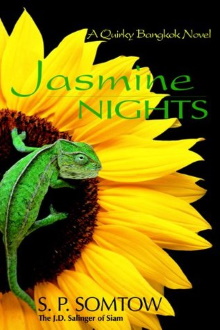
Chalk this up as another one of those novels that I would never have read on my own and was glad I did. This is effectively a coming of age novel by Thai writer S.P. Somtow. Though Somtow’s first career was as a celebrated composer and musician, he has also made a name for himself as a writer who dabbles in horror, fantasy and science-fiction. This title itself however should count as a non-genre book being based on the author’s own memories of growing up in Bangkok in the 1960s. It does have more than a fair bit of magical realism, which now that I think of, seems to be pretty common in novels of this type.
At the age of twelve, the physical world that the protagonist knows is limited to the admittedly expansive compound of his affluent household. His family calls him by the nickname Little Frog but raised on a diet of classic Western literature, his own secret name for himself is Justin. As his parents have been away for some time, he is effectively raised by his three unmarried aunts with his only companions being a pet chameleon and an extensive library of books. One day however all this changes when his chameleon is accidentally killed at a funeral for a relative he does not know and he discovers that the old ruined house which he treats as his playground is actually inhabited by his great grandmother. The very aged woman encourages him to make friends with his own age and indeed he discovers a treehouse built inside his family’s compound and befriends its owner, a black American boy named Virgil who lives next door. He also finds that Virgil has befriended the Thai son of his household gardener and treats him as a near-equal. This sets the stage for a story that encompasses childhood wonder, racism, struggle for identity and sex.
As a bildungsroman with elements of mysticism, this novel immediately reminded me of Midnight’s Children, though it is of course much shorter, simpler and less ambitious in its scope. However I found myself being entertained by this more mostly due to how much the main character speaks to me. Despite being Thai, Justin is unable to speak the Thai language due to a psychological block while pronouncing English like an English gentleman, much to Virgil’s shock. In his copious free time, he imagines himself living in classical Greece and fancies himself a poet and a playwright. He even eats only bacon and eggs for breakfast. Yet this novel is also about him reconnecting with his Thai heritage. It’s so much fun to read about how the Thai concept of reincarnation, evil spirits and witch doctors coexist with the Greek Fates, Homeric heroes and iambic pentameter in the landscape of his imagination. So a boat ride on a khlong with his newfound friends is likened to a journey down the Styx while his own modest efforts to mend the rifts between his friends makes him think of Lincoln. When he hears Virgil’s mother recount a story of their ancestors’ past as slaves in the US, he immediately recognizes it as retelling of a familiar Greek myth. Our greater familiarity with Thailand, such as when he describes a car ride down Sukhumvit, then still ringed with paddy fields, makes this novel so much more resonant.
The main fault with this novel is that as entertaining as it is to read about the excesses made possible by his family’s immense wealth, such as having a servant carry around a television set so that the children can watch their favorite show when they play, it isn’t counterbalanced by any real risk to the character himself. There’s some tension at first when he first ventures out of his comfort zone and you think that he may actually lose something of significance but you soon realize that this is really just an idealized childhood fantasy in which almost everything goes entirely his way. This includes getting his white American friends to accept Virgil and having girls all but throw themselves at him. I suppose that this is realistic as life really is that good when you’re born to such a rich and influential family but it does make the novel feel rather light. At least Somtow himself is aware of this and has Justin realize how ordinary people have problems he never even imagined such as when his beloved nanny is distressed at spending her entire life as a servant or when he hears news about the war raging in Vietnam while his perfect bubble of civilization in Bangkok is completely untouched.
In the end, this is a rather insubstantial novel and it’s crammed so full of fun details that I enjoyed it all the same. In a way, it’s like reading about a Thai version of Downton Abbey, complete with the well meaning but not terribly plausible effort to inject some moralizing. As with my other forays into mainstream non-genre literature, this isn’t good enough to make me a convert but I did enjoy dipping my toes into it and I loved the Thailand setting. Perhaps it is time I started reading some more serious stuff however.